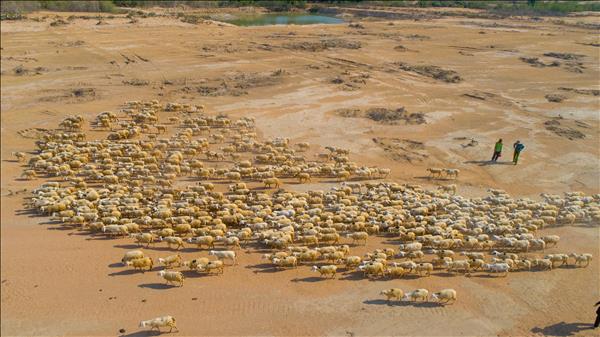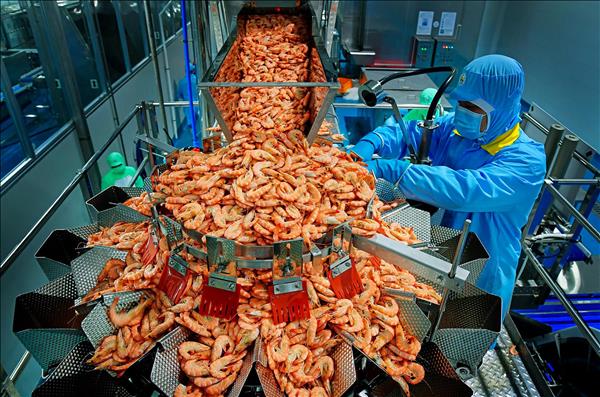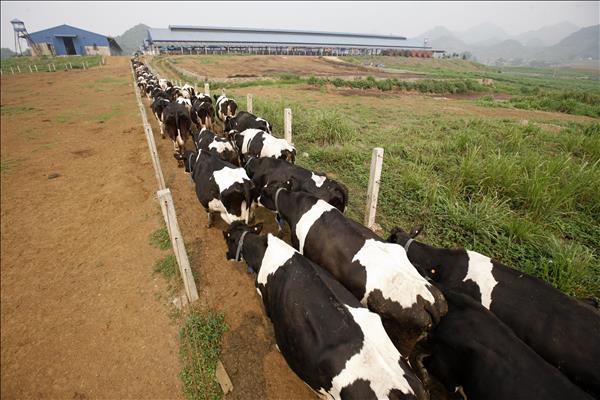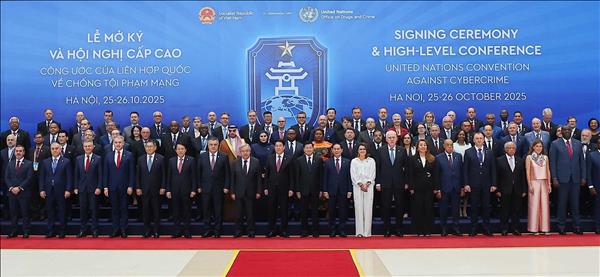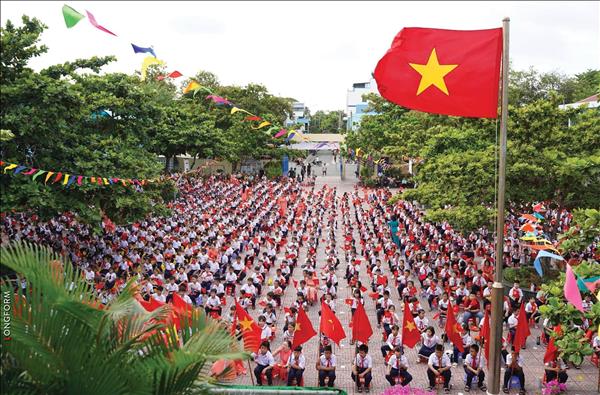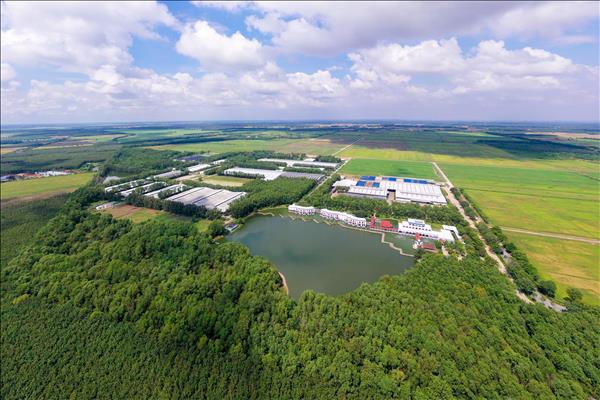Over the past four decades, Vietnam and the UN have always strived to nurture and build an increasingly better cooperative relationship with positive results and great potential for development.
Vietnam has received tremendous support from the UN and its members and demonstrated itself as an active and responsible member of the international community.
After the liberation of the south and national reunification, Vietnam had to both deal with severe war consequences and reorganise its poor and backward economy and gradually restore production.
Joining the UN was a great event that helped Vietnam establish its stature in the international arena. Vietnam has made a contribution to protecting the cause of peace, development and progress and has taken full advantage of the great spiritual and material support from international organisations for the reconstruction of the country during the tough years following the war and sanctions.
In the late 1970s and early 1980s, in addition to receiving aid from socialist countries, the UN assistance accounted for 60% of the total aid offered to Vietnam. During the country’s reform process as well as its acceleration of industrialisation, modernisation and international integration, the UN continues to actively support Vietnam, providing hundreds of millions of US dollars annually. This is one of the most important resources for Vietnam to successfully realise the socio-economic development goals and contribute to making Vietnam one of the countries that fulfills the UN’s Millennium Development Goals.
From the 1980s to the mid-1990s, Vietnam's activities at the UN prioritised the fight against the embargoes.
From the middle of this period, Vietnam started implementing aggressively its foreign policy of mutilateralisation, diversification, independence and self-reliance, helping the country gradually integrate into the region and the world.
In the 1997-2000 period, the UN’s support for Vietnam focused on poverty reduction efforts, implementation of social policies, management of environmental and natural resources, aid coordination, state management, and resources mobilization.
From 2001-2005, the UN shifted its technical assistance for Vietnam to the reform of economic institutions and policies, state-run businesses, public administration, law, public investment planning and the banking system. It also expanded its help in other fields such as HIV/AIDS and fatal diseases prevention, promoting grassroots democracy and gender equality.
Pursuing the external policy of multi-lateralisation and diversification of international relations, Vietnam has taken the UN forum as a basis to enhance relations with UN organisations and expand bilateral and multi-lateral relations with other countries and international organisations.
Vietnam has also actively co-operated with non-aligned and developing countries to fight for and protect the fundamental principles of the UN Charter while protecting the interests of developing countries.
Vietnam became an official member of the UN Chemical Weapons Convention in 1998, and was one of the first countries to sign the Comprehensive Nuclear-Test-Ban Treaty in 1996. The country also joined the Conference on Disarmament in 1996, and engaged in the preparation process for major conferences, such as conferences on the revision of the Treaty on the Non-Proliferation of Nuclear Weapons in 2000, 2005, and 2010, and on illegal trade of small weapons in 2001 and 2003.
In June 2014, Vietnam first sent its forces to participate in UN peacekeeping operations. Within the framework of the United Nations Initiative for Action - United Nations, the government of Viet Nam and the United Nations were actively coordinating the implementation of the United Nations General Plan for the period 2012-2016. Vietnam is one of 8 countries implementing the “One UN” initiative, which received high praise from the donor community.
With its great efforts and effective contributions to the operation and development of the UN, Vietnam has been trusted and highly appreciated by the international community. This is most clearly manifested through the country being elected to many bodies of the UN, receiving a high number of votes, especially the UN Security Council (2008-2009 term), the UN Economic and Social Council (1998-2000 and 2016-2018 tenures), the UN Human Rights Council (2014-2016 term), the UNESCO Executive Council (2015-2019 tenure) and the International Law Commission (2017-2021 term).
On the basis of the fine bilateral relationship over the past 40 years, Vietnam will strengthen ties with the UN in an extensive, effective and substantive fashion, thus contributing actively to maintaining peace, stability and sustainable development in the region and around the world.
As a responsible and active member in the UN’s activities, Vietnam will stand side by side with member countries in upholding the fundamental principles of the UN Charter and international laws, promoting fair and equal international relationships, friendship and cooperation between nations and ensuring the legitimate interests of all countries, especially developing nations.
Vietnam will also enhance its participation in the UN peacekeeping operations at a higher level; exert efforts to successfully implement the 2030 Agenda, Sustainable Development Goals and the Paris Agreement on climate change; and support the reform efforts of the UN, towards improving efficiency, transparency and democratisation in all activities.
Vietnam will focus on fulfilling its membership role in the UN’s mechanisms and taking the lead in priority areas by deploying many specific initiatives. The country will actively lobby for its bid for a non-permanent seat of the UN Security Council for the 2020-2021 term. If elected to this position, Vietnam will surely make active and substantial contributions to the UN’s efforts in preserving international peace and security, thereby enhancing the country’s status and prestige and contributing to the cause of peace, national independence, democracy and social progress in the world.
Vietnam and the UN will focus on implementing the Joint Strategic Plan for the period of 2017-2021 signed between the two sides in July. With four priority areas, including investing in people, ensuring adaptation to climate change and sustainable environmental development, promoting prosperity and partnership, and facilitating justice, peace and comprehensive governance, this Plan will support Vietnam in implementing the 2011-2020 Strategy for Sustainable Development, the Socio-economic Development Plan for the 2016-2020 period and the UN’s Sustainable Development Goals. This is an important premise for the deployment of specific cooperation activities between Vietnam and the UN in the coming years.
Vietnam has received tremendous support from the UN and its members and demonstrated itself as an active and responsible member of the international community.
After the liberation of the south and national reunification, Vietnam had to both deal with severe war consequences and reorganise its poor and backward economy and gradually restore production.
Joining the UN was a great event that helped Vietnam establish its stature in the international arena. Vietnam has made a contribution to protecting the cause of peace, development and progress and has taken full advantage of the great spiritual and material support from international organisations for the reconstruction of the country during the tough years following the war and sanctions.
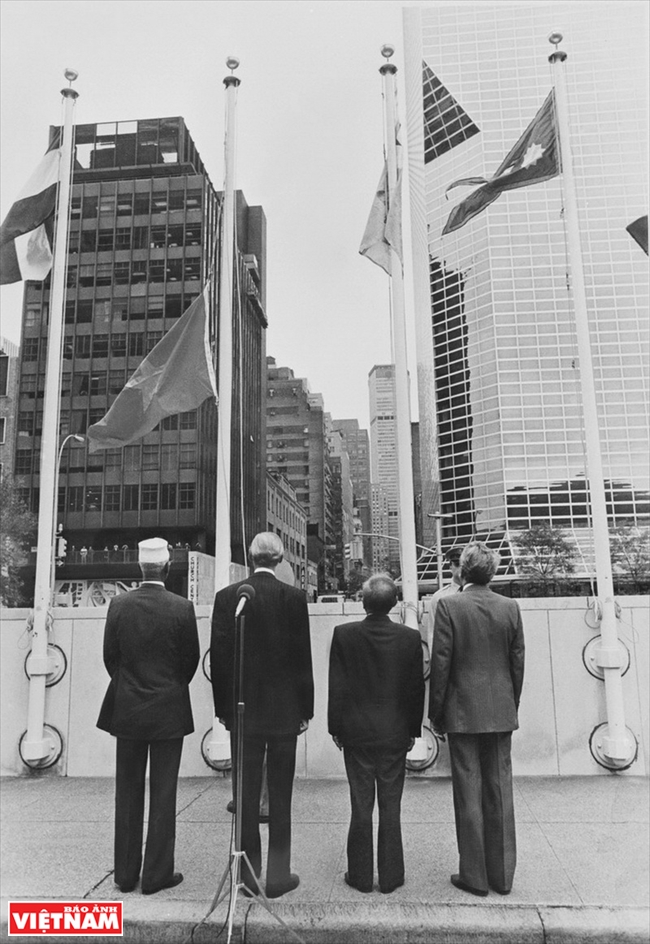 The ceremony of hoisting the Vietnamese flag at UN Headquarters on September 20, 1977, marking the event that Vietnam became an official member of the UN. Photo: VNA’s file 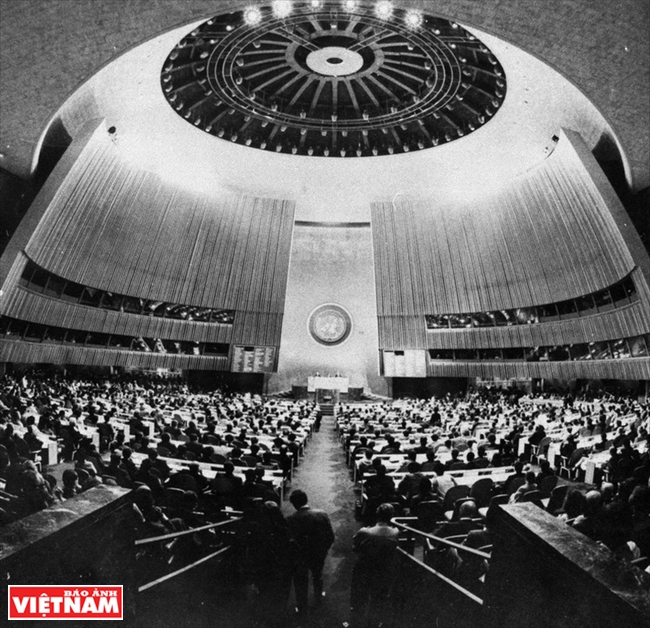 The opening of the 32nd Session of the UN General Assembly in New York on September 20, 1977 adopted a resolution recognising Vietnam as a member of the UN. Photo: VNA’s file 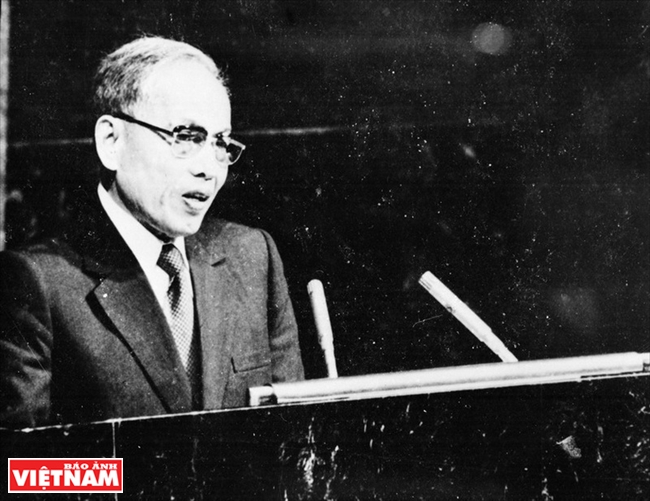 Foreign Minister Nguyen Duy Trinh addressed at the 32nd Session of the UN General Assembly in New York on September 20, 1977. The session adopted a resolution recognising Vietnam as a member of the UN. Photo: VNA’s file 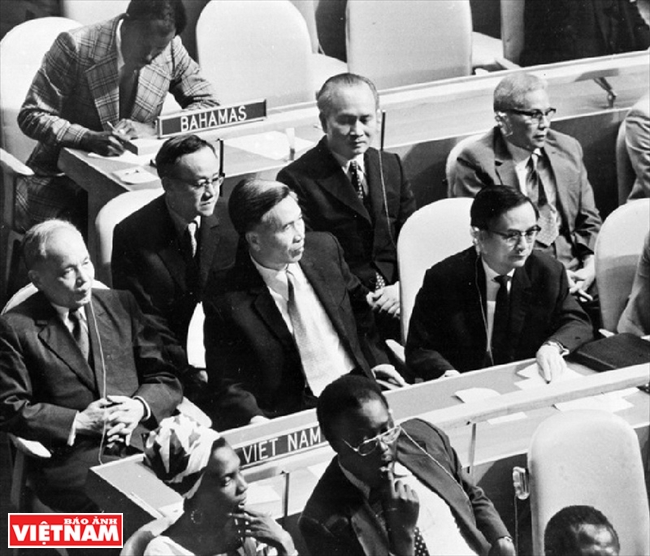 The Vietnamese delegation, led by Foreign Minister Nguyen Duy Trinh, attended the 32nd Session of the UN General Assembly in New York on September 20, 1977. The session adopted a resolution recognising Vietnam as a member of the UN. Photo: VNA’s file 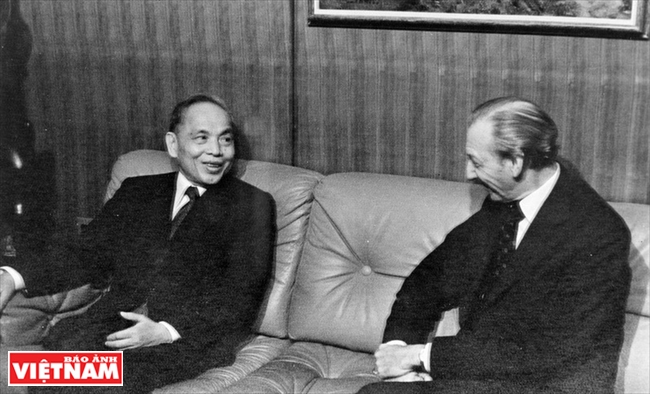 UN Secretary-General K.Vanhem met with Foreign Minister Nguyen Duy Trinh on September 20, 1977 at the 32nd Session of the UN General Assembly in New York. The session adopted a resolution recognising Vietnam as a member of the UN. Photo: VNA’s file |
In the late 1970s and early 1980s, in addition to receiving aid from socialist countries, the UN assistance accounted for 60% of the total aid offered to Vietnam. During the country’s reform process as well as its acceleration of industrialisation, modernisation and international integration, the UN continues to actively support Vietnam, providing hundreds of millions of US dollars annually. This is one of the most important resources for Vietnam to successfully realise the socio-economic development goals and contribute to making Vietnam one of the countries that fulfills the UN’s Millennium Development Goals.
From the 1980s to the mid-1990s, Vietnam's activities at the UN prioritised the fight against the embargoes.
From the middle of this period, Vietnam started implementing aggressively its foreign policy of mutilateralisation, diversification, independence and self-reliance, helping the country gradually integrate into the region and the world.
In the 1997-2000 period, the UN’s support for Vietnam focused on poverty reduction efforts, implementation of social policies, management of environmental and natural resources, aid coordination, state management, and resources mobilization.
From 2001-2005, the UN shifted its technical assistance for Vietnam to the reform of economic institutions and policies, state-run businesses, public administration, law, public investment planning and the banking system. It also expanded its help in other fields such as HIV/AIDS and fatal diseases prevention, promoting grassroots democracy and gender equality.
Pursuing the external policy of multi-lateralisation and diversification of international relations, Vietnam has taken the UN forum as a basis to enhance relations with UN organisations and expand bilateral and multi-lateral relations with other countries and international organisations.
Vietnam has also actively co-operated with non-aligned and developing countries to fight for and protect the fundamental principles of the UN Charter while protecting the interests of developing countries.
Vietnam became an official member of the UN Chemical Weapons Convention in 1998, and was one of the first countries to sign the Comprehensive Nuclear-Test-Ban Treaty in 1996. The country also joined the Conference on Disarmament in 1996, and engaged in the preparation process for major conferences, such as conferences on the revision of the Treaty on the Non-Proliferation of Nuclear Weapons in 2000, 2005, and 2010, and on illegal trade of small weapons in 2001 and 2003.
In June 2014, Vietnam first sent its forces to participate in UN peacekeeping operations. Within the framework of the United Nations Initiative for Action - United Nations, the government of Viet Nam and the United Nations were actively coordinating the implementation of the United Nations General Plan for the period 2012-2016. Vietnam is one of 8 countries implementing the “One UN” initiative, which received high praise from the donor community.
With its great efforts and effective contributions to the operation and development of the UN, Vietnam has been trusted and highly appreciated by the international community. This is most clearly manifested through the country being elected to many bodies of the UN, receiving a high number of votes, especially the UN Security Council (2008-2009 term), the UN Economic and Social Council (1998-2000 and 2016-2018 tenures), the UN Human Rights Council (2014-2016 term), the UNESCO Executive Council (2015-2019 tenure) and the International Law Commission (2017-2021 term).
On the basis of the fine bilateral relationship over the past 40 years, Vietnam will strengthen ties with the UN in an extensive, effective and substantive fashion, thus contributing actively to maintaining peace, stability and sustainable development in the region and around the world.
As a responsible and active member in the UN’s activities, Vietnam will stand side by side with member countries in upholding the fundamental principles of the UN Charter and international laws, promoting fair and equal international relationships, friendship and cooperation between nations and ensuring the legitimate interests of all countries, especially developing nations.
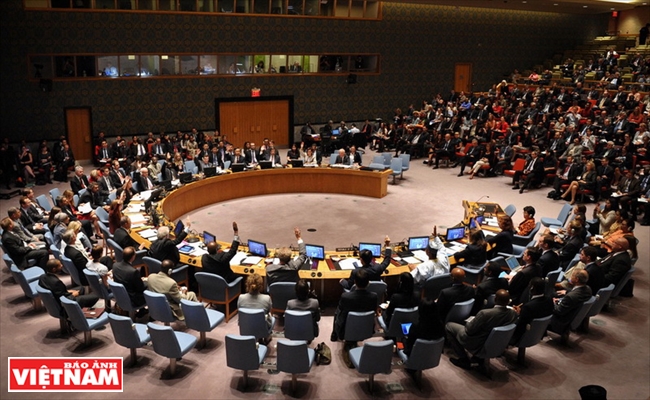 The UN Security Council Meeting on Ebola held on September 18, 2014. Photo: VNA’s file 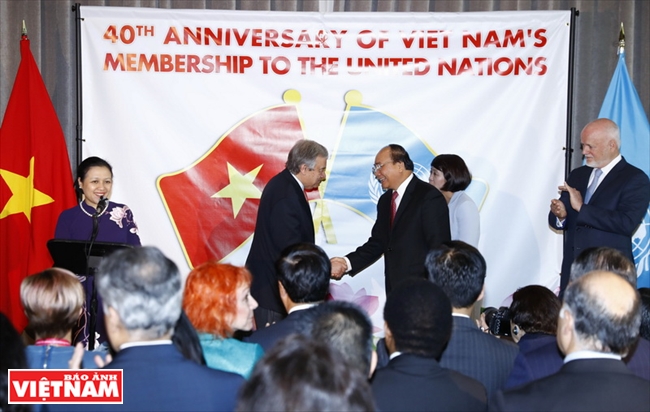 On May 30, 2017, at the UN Headquarters in New York, Prime Minister Nguyen Xuan Phuc attended the 40th anniversary of Vietnam joining the UN. In the photo: UN Secretary-General Antonio Guterres (left) welcomes Prime Minister Nguyen Xuan Phuc. Photo: Thong Nhat/VNA  On the evening of September 14, 2017 at UN Headquarters in Geneva, Deputy Prime Minister Vuong Dinh Hue attended and delivered a speech at the 40th Anniversary of Vietnam's Accession to the UN (September 20,1977 – September 20, 2017) and the 72nd National Day of Vietnam (2/9). In the photo: Deputy Prime Minister Vuong Dinh Hue delivers a speech. Photo: Hoang Hoa / VNA 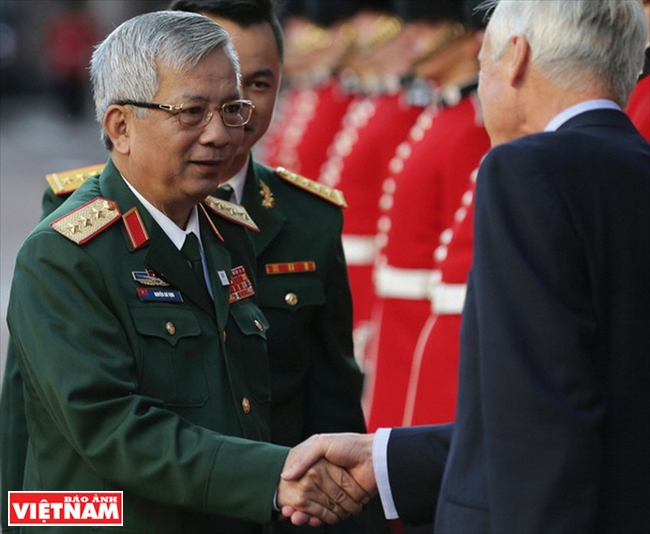 A Ministry of Defense delegation led by Vice Defence Minister Nguyen Chi Vinh attended the UN Peacekeeping Defence Ministerial held in London on September 8, 2016. Photo: VNA’ file 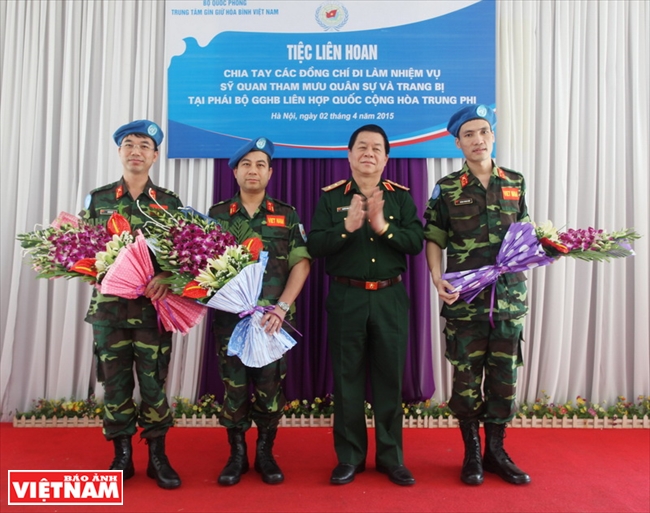 On April 2, 2015, the Vietnam Peacekeeping Centre organised a farewell ceremony for three Vietnamese officials, including Lieutenant Colonel Nguyen Xuan Thanh, Major Vu Van Hiep and Captain Hoang Trung Kien who will take duty in the Central African Republic: Photo: Hong Pha/VNA. 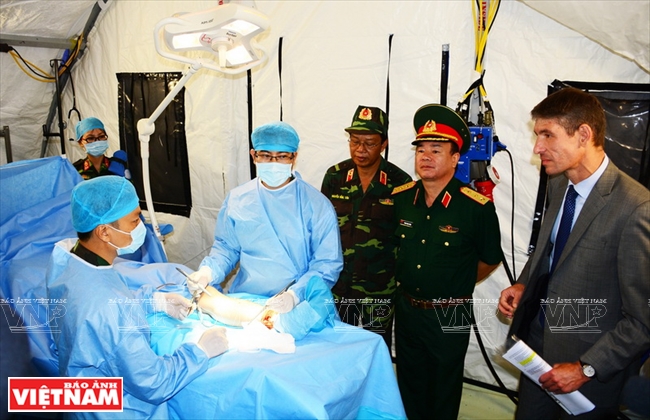 From September 6-23, 2017, the Vietnam Peacekeeping Centre coordinates with Military Hospital 175 and relevant agencies of the Vietnamese Ministry of Defense organised a practical training program for level-2 field hospital equipment. The practical training on the equipment used in Vietnam’s first field hospital model, set to join the United Nations peacekeeping mission in South Sudan in 2018. Photo: VNA |
Vietnam will also enhance its participation in the UN peacekeeping operations at a higher level; exert efforts to successfully implement the 2030 Agenda, Sustainable Development Goals and the Paris Agreement on climate change; and support the reform efforts of the UN, towards improving efficiency, transparency and democratisation in all activities.
Vietnam will focus on fulfilling its membership role in the UN’s mechanisms and taking the lead in priority areas by deploying many specific initiatives. The country will actively lobby for its bid for a non-permanent seat of the UN Security Council for the 2020-2021 term. If elected to this position, Vietnam will surely make active and substantial contributions to the UN’s efforts in preserving international peace and security, thereby enhancing the country’s status and prestige and contributing to the cause of peace, national independence, democracy and social progress in the world.
Vietnam and the UN will focus on implementing the Joint Strategic Plan for the period of 2017-2021 signed between the two sides in July. With four priority areas, including investing in people, ensuring adaptation to climate change and sustainable environmental development, promoting prosperity and partnership, and facilitating justice, peace and comprehensive governance, this Plan will support Vietnam in implementing the 2011-2020 Strategy for Sustainable Development, the Socio-economic Development Plan for the 2016-2020 period and the UN’s Sustainable Development Goals. This is an important premise for the deployment of specific cooperation activities between Vietnam and the UN in the coming years.
|
Vietnam is actively campaigning for being elected as a non-permanent member of the Security Council 2020 – 2021 tenure with a hope to make contributions to maintaining peace and enhancing its position and prestige in the international arena. |
By VNA

